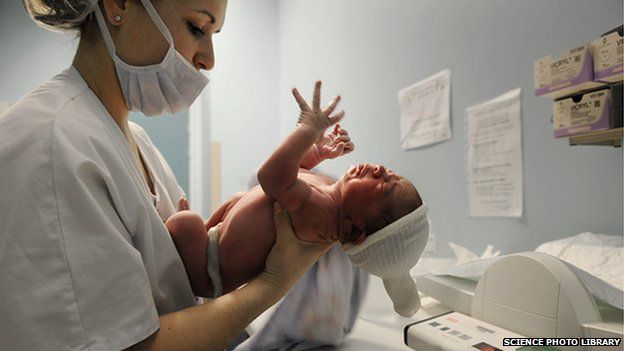Why do people eat placentas?
- Published

It is a waste product from childbirth, so why would anyone choose to eat a raw human placenta?
It sustains life in the womb and has fulfilled its primary purpose once it leaves the mother during childbirth. The human placenta then becomes something rather messy to be discarded - but not everyone sees it that way.
The nutrients that have passed from mother to foetus over months of pregnancy are, some believe, still packed inside the bloody organ and should not be wasted. Instead, the raw placenta could provide just what the mother needs as she recovers from childbirth and begins breastfeeding. And that means eating it.
Some women are opting to drink the placenta in a fruit smoothie within hours of giving birth, keeping it cool and sending it off to be dried and made into capsules, or even ripping of a chunk and placing it by their gums.
They are convinced that the magic bullet gives them an energy boost, can encourage breast milk production and even prevent post-natal depression.
The Independent Placenta Encapsulation Network (IPEN) is tapping into the recent trend for eating placenta and charges £150 for capsules, £25 for a smoothie.
But the company is currently awaiting the outcome of a court case that could see it shut down.
In what is thought to be the first case of its kind, Dacorum Borough Council prevented IPEN from trading in October last year over concerns about bacterial contamination.
Watford magistrates heard the case and have reserved judgement on the matter.
Charlie Poulter, from Reading, is convinced that ingesting a palm-sized piece of placenta within a cocktail of red berries and banana gave her energy after her labour.
"I did drink it rather quickly because I didn't want to think about it," she said.
"But I'd just pushed a baby out, I'd had lots of people look at me. It felt insignificant compared to what I had just gone through.
"I thought 'if this is going to stop post-natal depression and give me some energy, then I can drink three-quarters of a pint of liquid. Man up and drink it'.
The 30-year-old's motivation was pretty clear.
She had been receiving therapy for depression for 18 months when she became pregnant and was concerned about developing post-natal depression.
"I had never heard of placenta encapsulation before but found out that it could help with the baby blues.
"I was willing to try anything and my husband said that even if it had a placebo effect, it doesn't matter, it's not going to harm you."
IPEN advised her to put her wishes in in her birthing plan and inform her midwife.
An IPEN specialist was to make a placenta smoothie at her hospital bedside, so Charlie requested a private room for her labour in June 2011.
A cool box was also an essential item in her hospital bag, so IPEN could store more of her placenta to dry and make into capsules, which Charlie received within a few days.
Another piece was soaked in alcohol for a tincture, the latter of which she still uses "like Rescue Remedy".
"My daughter Lillian was my first child, so I have nothing to compare this to, but I had a lot of energy - I didn't feel completely dead.
"My husband was more exhausted than I was."
She also says she did not develop post-natal depression and "swears it was the placenta". She has since become an IPEN specialist herself.
Humans are in the minority over placentophagy, or eating the placenta.
With the exception of marine mammals and some domesticated ones, all other mammals consume the afterbirth - possibly to help with the bonding process.
Dried placenta is used in some traditional Chinese medicine and is thought to be a restorative, but the practice of placentophagy is a more recent trend in western culture and is not without controversy
In 1998, Channel 4 was reprimanded for showing a woman's afterbirth being served up as pate by TV chef Hugh Fearnley-Whittingstall.
The placenta was fried with shallots and garlic, flambeed, pureed and served to a new mother's 20 relatives and friends as a pate on focaccia bread.
The Broadcasting Standards Commission said the episode of TV Dinners, shown in February, breached a taboo and "would have been disagreeable to many".
Labour's Kevin McNamara, who was then MP for Hull North, said the programme was "offensive to the public".
More recently, US actress and vegan Alicia Silverstone published placenta recipes after eating her afterbirth, and Mad Men actress January Jones reported consumed dried placenta capsules after the birth of her son Xander.
Writer Nick Baines gave a mixed review after he whizzed up a smoothie and tucked into a taco - both containing his wife's raw placenta following the birth of their son.
But what of the science?
Mother's choice
To date, there is not one double-blind placebo controlled study on human placentophagy.
Last year, the University of Nevada surveyed women who had eaten their placenta. Many reported health benefits, but, the researchers said, very little work had been carried out to assess this anecdotal evidence.
The Royal College of Midwives (RCM) said there was not enough evidence for the organisation to "either support or not support" placentophagy as there had not been enough research on the health benefits.
But spokeswoman Jacque Gerrard said: "Our view is that if a mother wants to keep her placenta, it's her choice and it should be facilitated."
She added that while "anecdotally" they were hearing about more women asking to keep the placenta, they could not say if there had been an "actual rise" because it was not something they monitored.
Whatever the health benefits, there is no denying the strong reaction the subject raises whenever placentophagy makes the news.
- Published7 May 2014